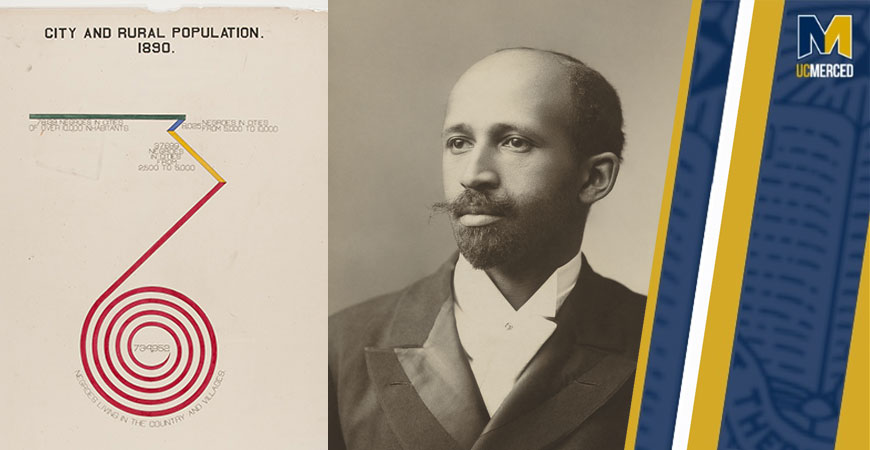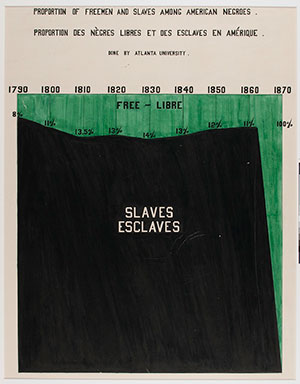
Editor's note: In honor of Black History Month, the UC Merced newsroom is highlighting some of the organizations, services and people who serve or represent the Black community on campus.
We all need heroes.
Perhaps that was on Roy Wilkins’ mind as he faced the sea of humanity – 250,000 strong – on a warm August afternoon in 1963. At the podium on the Lincoln Memorial, the executive secretary of the NAACP stood to inspire the throng gathered for the March on Washington for Jobs and Freedom.
“This has been a long fight,” Wilkins said, his amplified voice echoing down the National Mall. “We were reminded of it by the news of the death yesterday of Dr. W.E.B. Du Bois. … At the dawn of the 20th century, his was the voice that was calling to you to gather here today in this cause.”
Minutes later, the Rev. Dr. Martin Luther King immortalized the day, declaring “I have a dream.” Wilkins, meanwhile, had reminded the multitude of multigenerational lines of civil rights flag bearers, including a brilliant and prolific Black social scientist whose pioneering work and words can continue to inspire.
A team of UC Merced researchers wants to tap that potential, embarking on a multi-institution project to free Du Bois from the margins of textbooks and center him as inspiration for racial and ethnic minority students in courses that emphasize innovation, problem-solving and critical thinking.
UC Merced is one of three strikingly different universities developing curricula for STEM courses that spotlight Du Bois’ contributions to statistics and data science. A centerpiece of the project is a collection of information graphics from a team guided by Du Bois’ meticulous sociological research. The artful charts and maps – decades ahead of their time – framed institutionalized racism in the United States and challenged a spectrum of viewers at the 1900 Paris Exposition.

The graphics are a window into the extraordinary life and achievements of William Edward Burghardt Du Bois (pronounced dew-BOYS). He also:
- Was the first African-American to earn a Ph.D. from Harvard University.
- Spent years living in and researching Philadelphia’s 7th Ward, resulting in “The Philadelphia Negro,” a study that set a benchmark for academic rigor in urban sociology.
- Introduced, in his seminal book “The Souls of Black Folk,” the concept of “double consciousness” – Blacks ricocheting between being Americans and members of an oppressed minority.
- Co-founded the National Association for the Advancement of Colored People (NAACP) in 1909. He then edited the association’s magazine, The Crisis, for more than two decades.
- Foreshadowed the NAACP years earlier by co-founding the Niagara Movement, which advocated for civil and political rights for Blacks.
And yet in current texts covering the history of sociology, Du Bois appears only in the margins, eclipsed by contemporaries such as Emile Durkheim, Karl Marx and Max Weber, said Leia Belt, a post-doctoral fellow working on the Du Bois project at UC Merced.
“Du Bois was marginalized when he was creating his scholarship, and some of that marginalization hasn't changed over time,” Belt said.
In addition to UC Merced, Princeton University and Fisk University in Tennessee are developing the Du Bois curriculum under a three-year, $2 million National Science Foundation grant. Du Bois earned an undergraduate degree at Fisk, a historically Black institution. The three universities will develop the module, which will include videos, interactive assignments and readings of Du Bois’ published work. The content will be fine-tuned through surveys of student and faculty focus groups.
Fourteen UC Merced faculty members who teach undergraduate STEM courses have signed on to the project; the local principal investigators are Charlie Eaton and Whitney Pirtle , both UC Merced sociology professors.
The UC Merced team will coordinate the development of the module with PIs at the other two universities and an independent designer/developer who, in 2021, sparked a Du Bois mini-Renaissance with a tweet. Anthony Starks challenged Twitter followers to reimagine the original paper-and-pen infographics with modern data visualization tools such as Tableau. #TheDuBoisChallenge spawned hundreds of creations and provided a fresh view of Du Bois that inspired the STEM curriculum project.
“Folks made visualizations that were amazing,” Belt said. That led to conversations between Eaton, Starks and Princeton colleagues. “They were all chatting about how they could make this bigger than an online Twitter challenge,” she said.
Fast forward to spring 2023, with the National Science Foundation grant in hand and Fisk University, along with a multitude of scholars such as Belt, aboard.
The Du Bois STEM project dovetails with Belt’s research into how Du Bois was marginalized in scholarly texts and citations considered canon in the history of sociology. Who were the founders, according to these texts? What were students being taught on the “ancestors of knowledge” – as Belt described them – in the humanities and social sciences?
“What I found,” Belt said, “are that women and folks of color – along with other folks at the intersections of those identities – were on the outside, while white men were more central.”
The Du Bois curriculum project intends to put its namesake where he belongs – as a paradigm-shifting giant from history who can inspire racial and ethnic minority STEM students – and all scholars.
“This project is a very good way to build a bridge to where people don’t just mention Du Bois one week a year, but integrate him as a founder of sociological knowledge and methodological advancements,” Belt said.
Learn more about W.E.B. Du Bois
Du Bois Day celebration at Fisk University (video)
"The Scholar Denied: W. E. B. Du Bois and the Birth of Modern Sociology," by Aldon Morris
"W.E.B. Du Bois's Data Portraits: Visualizing Black America," by Britt Rusert and Whitney Battle-Baptiste

